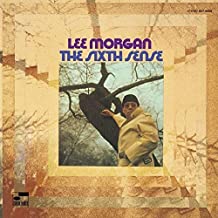
Requisites
The Sixth Sense ~ Lee Morgan | By Eddie Carter
Mention trumpeter Lee Morgan during his years at Blue Note and one of seven albums usually comes to mind. Blue Train (1957), Art Blakey and The Jazz Messengers (1958), Leeway (1961), The Sidewinder and Search For The New Land (1964), Cornbread (1967), and The Gigolo (1968). All are considered choice selections for any library featuring the talented bandleader and composer. Lee was the youngest musician in Dizzy Gillespie’s orchestra, joining the band at age eighteen and further honed his skills with The Jazz Messengers from 1958 to 1961.
Drug addiction temporarily derailed his career from 1961 to 1963, but he emerged stronger and got his life back on track, recording prolifically as a leader and sideman. The Sidewinder became his biggest-selling album and greatest success, changing all Blue Note releases that followed. The Sixth Sense (Blue Note BST 84335) hit the stores in 1969 featuring one of his best groups. Jackie McLean on alto sax, Frank Mitchell on tenor sax, Cedar Walton on piano, Victor Sproles on bass, and Billy Higgins on drums complete the ensemble. My copy used in this report is the 1969 Liberty Records Stereo album.
The Sixth Sense, the first of four tunes by the leader kicks off Side One with a relaxing drum introduction by Billy, segueing into an intriguing Bossa Nova styled melody led by the front line. Lee solos first, pacing himself at an easy swing with plenty of feeling. Frank displays his inventive ability with a passionately frisky tone next, then Jackie takes flight on a solo full of tasty grooves. Cedar comes next, conveying an abundance of youthful energy, and Billy exchanges a spirited conversation with Lee leading to the ensemble’s closing chorus and fadeout.
Short Count, the second Morgan tune takes an aggressive uptempo approach to the melody vigorously. McLean charges out of the gate, almost stealing the show with incandescent intensity anchored by Lee and Frank on his final verse. Morgan raises the temperature a few more degrees to a level of feisty assertiveness on the next reading. Mitchell applies some high voltage to the third interpretation. Walton delivers the final enthralling statement before the quintet takes the song out.
Morgan’s Psychedelic will set your body in motion and have you dancing from the rhythm section’s leisurely flowing introduction to the infectious theme. Lee establishes the relaxing atmosphere on the opening chorus with bluesy lines. Frank shows some improvisational creativity on the next performance. Jackie takes over for some fine blowing and Cedar keeps things interesting with nimble fingers until the ensemble’s fadeout.
Afreaka is Cedar Walton’s contribution to the album, starting Side Two with an Afrobeat flavor possessing a very interesting rhythm that’s also danceable. Morgan, McLean, Mitchell, and Walton are the principal soloists providing plenty of musical inspiration. Anti-Climax, the final tune from the trumpeter’s pen begins with a brief bass introduction by Victor preceding the sextet’s upbeat theme treatment. Lee opens the first solo with inspired agility, then Jackie charges into the second statement with a dazzling improvisation. Frank infuses the next presentation with strong-lined lyricism, and Cedar finishes with an aggressive reading preceding the ending.
The Cry Of My People by trumpeter Cal Massey ends the album with a gorgeous quartet number by Morgan and the trio. Lee begins the melody with a hauntingly elegant-muted performance, picking up the pace gradually for his exceptionally pretty opening statement. Cedar gets a brief moment to share his thoughts with evocative softness, then Lee returns with so much sensitivity and feeling, it’ll bring tears to your eyes. The sound quality on The Sixth Sense is superb with all six instruments full of body, presence, and a vibrantly, clear sound.
Lee Morgan was an exceptional composer and musician who possessed an exciting, relentless drive. He recorded twenty-five albums for Blue Note as a leader and appeared as a sideman on countless others, elevating each record to something special. But changes were on the way as AllMusic.com reviewer Michael G. Nastos describes. “The appropriate title Sixth Sense presents a transition between one of the most intriguing sextets during the last years of post-bop and Morgan’s final ensembles that saw him reaching higher and higher before, like Icarus, falling from grace”.
Lee would die tragically from a gunshot wound by his common-law wife Helen Morgan on February 19, 1972, after an altercation while performing at jazz club Slug’s Saloon in New York City. He left an incredible body of music also recording for Savoy, Vee-Jay, and Jazzland that still amazes and thrills fans around the world. At just over thirty-nine minutes, The Sixth Sense by Lee Morgan is an excellent album that you’ll play again and again, and a must-have for any Hard-Bop fan’s library!
~ Quote by Michael G. Nastos – Source: AllMusic.com~ Art Blakey and The Jazz Messengers (Blue Note BLP 4003/BST 84003); Blue Train (BLP 1577/BST 81577); Cornbread (BLP 4222/BST 84222); Leeway (BLP 4034/BST 84034); Search For The New Land (BLP 4169/BST 84169); The Gigolo (BLP 4214/BST 84214); The Sidewinder (Blue Note BLP 4157/BST84157) – Source: Discogs.com
~ Lee Morgan, Helen Morgan – Source: Wikipedia.org © 2020 by Edward Thomas Carter
More Posts: choice,classic,collectible,collector,history,instrumental,jazz,music


